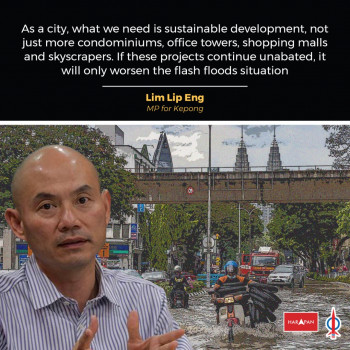By Lim Mun Fah, translated by Soong Phui Jee
The latest number of voters has surged to 13.3 million people, setting a new record high since independence. There are 3.9 million of fresh voters, accounting for 23% of the total voters.
Many people think that fresh voters mean young voters. In fact, it is not the case.
Some friends of mine are in their 50s and 60s but registered as voters only in last year. They should also be considered as fresh voters, even though they are not young at all.
In fact, those who have been qualified to vote for more than five years, or even 20 years, but have not yet cast even a vote should also be called fresh voters.
It is not easy to accurately calculate the actual number of fresh voters. But in any case, fresh voters have been regarded as the kingmaker in the 2013 general election and therefore, they are also the targets of both the ruling and alternative coalitions in vote canvassing.
The average turnout rate of the last general election was 72%. In other words, 28% of voters did not vote. We do not have information to find out whether most of them were old people or young people. Based on the stereotype, most of them should be old people.
Such an impression was formed as young people gave the impression of being indifferent to politics before the 2008 general election. One of the main reasons was because the election results had always be the same and thus, many lacked enthusiasm to vote.
However, a new political landscape with some changes was formed after the 2008 general election. The political enthusiasm and concern for public issues of today’s young people are very different from those before the 2008 general election.
It is worthy of observation as most young fresh voters are dissatisfied with existing law and order, governance and corruption. The accumulated dissatisfaction would usually lead to an outbreak during the election and be vented through ballots. It seems to have become a norm of democratic politics in recent years. The rolling tide is irresistible even by Singapore, a country reputable in governance and integrity.
Personally, I also observed another change, that is, young people’s first vote was greatly affected by their parents in the past. Today, however, it seems parents are influenced by their children instead.
I found that many modern parents are proud of their children who are more highly educated and think that their children are more knowledgeable compared to them. Children followed their parents’ choices of candidates in the past but nowadays, parents’ are affected by their children. You may find today’s parents actually weight their children’s opinions very heavily by just listening to the conversations among uncles and aunties in wet markets or coffee shops.
Therefore, I boldly predict that fresh voters will affect the turnout rate, as well as the results of the coming general election.
_________________________
* This views expressed here are the personal opinion of the columnist and this article first appeared in mysinchew.com



